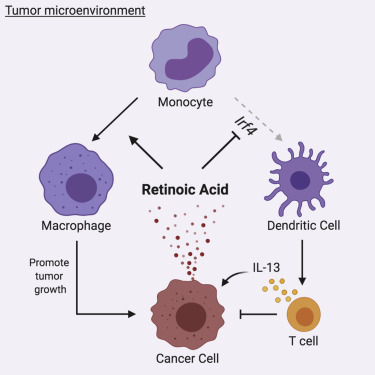Our official English website, www.x-mol.net, welcomes your
feedback! (Note: you will need to create a separate account there.)
Tumor-Derived Retinoic Acid Regulates Intratumoral Monocyte Differentiation to Promote Immune Suppression.
Cell ( IF 45.5 ) Pub Date : 2020-03-12 , DOI: 10.1016/j.cell.2020.02.042 Samir Devalaraja 1 , Tsun Ki Jerrick To 1 , Ian W Folkert 2 , Ramakrishnan Natesan 3 , Md Zahidul Alam 4 , Minghong Li 4 , Yuma Tada 4 , Konstantin Budagyan 5 , Mai T Dang 6 , Li Zhai 4 , Graham P Lobel 7 , Gabrielle E Ciotti 7 , T S Karin Eisinger-Mathason 7 , Irfan A Asangani 8 , Kristy Weber 9 , M Celeste Simon 10 , Malay Haldar 1
Cell ( IF 45.5 ) Pub Date : 2020-03-12 , DOI: 10.1016/j.cell.2020.02.042 Samir Devalaraja 1 , Tsun Ki Jerrick To 1 , Ian W Folkert 2 , Ramakrishnan Natesan 3 , Md Zahidul Alam 4 , Minghong Li 4 , Yuma Tada 4 , Konstantin Budagyan 5 , Mai T Dang 6 , Li Zhai 4 , Graham P Lobel 7 , Gabrielle E Ciotti 7 , T S Karin Eisinger-Mathason 7 , Irfan A Asangani 8 , Kristy Weber 9 , M Celeste Simon 10 , Malay Haldar 1
Affiliation

|
The immunosuppressive tumor microenvironment (TME) is a major barrier to immunotherapy. Within solid tumors, why monocytes preferentially differentiate into immunosuppressive tumor-associated macrophages (TAMs) rather than immunostimulatory dendritic cells (DCs) remains unclear. Using multiple murine sarcoma models, we find that the TME induces tumor cells to produce retinoic acid (RA), which polarizes intratumoral monocyte differentiation toward TAMs and away from DCs via suppression of DC-promoting transcription factor Irf4. Genetic inhibition of RA production in tumor cells or pharmacologic inhibition of RA signaling within TME increases stimulatory monocyte-derived cells, enhances T cell-dependent anti-tumor immunity, and synergizes with immune checkpoint blockade. Furthermore, an RA-responsive gene signature in human monocytes correlates with an immunosuppressive TME in multiple human tumors. RA has been considered as an anti-cancer agent, whereas our work demonstrates its tumorigenic capability via myeloid-mediated immune suppression and provides proof of concept for targeting this pathway for tumor immunotherapy.
中文翻译:

肿瘤衍生维甲酸调节肿瘤内单核细胞分化以促进免疫抑制。
免疫抑制性肿瘤微环境(TME)是免疫治疗的主要障碍。在实体瘤中,为什么单核细胞优先分化为免疫抑制性肿瘤相关巨噬细胞 (TAMs) 而不是免疫刺激性树突状细胞 (DCs) 尚不清楚。使用多个小鼠肉瘤模型,我们发现 TME 诱导肿瘤细胞产生视黄酸 (RA),通过抑制促进 DC 的转录因子 Irf4,使肿瘤内单核细胞向 TAM 分化并远离 DC。肿瘤细胞中 RA 产生的遗传抑制或 TME 内 RA 信号传导的药理学抑制增加刺激性单核细胞衍生细胞,增强 T 细胞依赖性抗肿瘤免疫,并与免疫检查点阻断协同作用。此外,人类单核细胞中的 RA 反应基因特征与多种人类肿瘤中的免疫抑制 TME 相关。RA 被认为是一种抗癌剂,而我们的工作通过骨髓介导的免疫抑制证明了其致瘤能力,并为靶向该途径进行肿瘤免疫治疗提供了概念证明。
更新日期:2020-03-12
中文翻译:

肿瘤衍生维甲酸调节肿瘤内单核细胞分化以促进免疫抑制。
免疫抑制性肿瘤微环境(TME)是免疫治疗的主要障碍。在实体瘤中,为什么单核细胞优先分化为免疫抑制性肿瘤相关巨噬细胞 (TAMs) 而不是免疫刺激性树突状细胞 (DCs) 尚不清楚。使用多个小鼠肉瘤模型,我们发现 TME 诱导肿瘤细胞产生视黄酸 (RA),通过抑制促进 DC 的转录因子 Irf4,使肿瘤内单核细胞向 TAM 分化并远离 DC。肿瘤细胞中 RA 产生的遗传抑制或 TME 内 RA 信号传导的药理学抑制增加刺激性单核细胞衍生细胞,增强 T 细胞依赖性抗肿瘤免疫,并与免疫检查点阻断协同作用。此外,人类单核细胞中的 RA 反应基因特征与多种人类肿瘤中的免疫抑制 TME 相关。RA 被认为是一种抗癌剂,而我们的工作通过骨髓介导的免疫抑制证明了其致瘤能力,并为靶向该途径进行肿瘤免疫治疗提供了概念证明。











































 京公网安备 11010802027423号
京公网安备 11010802027423号